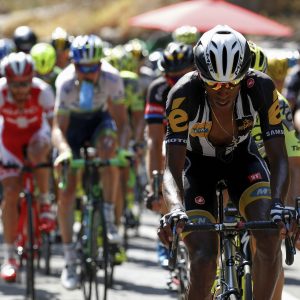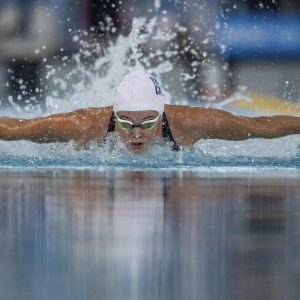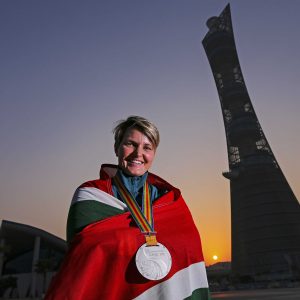Ashleigh Moolman Pasio has it figured out
The cyclist has had her fair share of disappointments at the Olympics. But they’ve helped her determine what type of road racer she is, leaving her confident and in form for Tokyo.
Author:
23 July 2021

At her third and final Olympic Games, Ashleigh Moolman Pasio once again will watch the opening ceremony on the television in her room in the athletes’ village, 16km from the Olympic Stadium.
“It’s a special experience but a very tiring one, so I can’t go as cycling is always one of the first events,” said Moolman Pasio. “My third Olympics and I haven’t been to one opening ceremony. You can’t be on your feet for that length of time before you are going to take part in one of the biggest events of your life.”
It’s a sacrifice of sorts, but a small one compared with those Moolman Pasio has made to become a professional cyclist. She has a love-hate relationship with the Olympics, one that began as a dream to ride horses at the Games but was realised in a different discipline in an overwhelming and promising race in London 2012, and a tough mental fight with herself in Rio. Heading into Tokyo, she says she is in peak form and the perfect mental space. The restrictions imposed by Covid-19 were just another of the hurdles she has overcome on her journey.
Related article:
“I think the pandemic year has made me stronger mentally as well as physically, and more robust. Things are clicking and coming into gear,” said Moolman Pasio. “I was always a person who had the ability to persevere and never give up. I’ve overcome some really big challenges in the early part of my life. I had a near-fatal head injury after a horse-riding accident in the middle of my final year at school. I was in a coma for 10 days. Doctors said I would never finish school. I set out to prove the doctors wrong and managed to write my final exams three months after the accident and got seven distinctions.”
Horse riding was her first love. As a child it was always her dream to go to the Olympic Games, but not as a cyclist. “I wanted to take part in the equestrian competition. I loved horses. I grew up with horses. I watched the horse movies. International Velvet was about a girl who went to the Games for the equestrian competition. I watched that movie so many times.”
But that was not to be. She was okay at other sports, a bit above average. She discovered cycling at university, where she met her husband Carl Pasio, a talented endurance multi-sport athlete. He identified her gift for cycling. Horses were replaced by bikes. Four legs bad. Two wheels good.
Giro tough
Moolman Pasio raced at a national level and picked up results. Roy Gershow and his Team Cycle Lab project, which had a relationship with the Belgian Lotto outfit, spotted her. She and Pasio decided to fully commit to trying to make it as professional athletes, which evolved into focusing on Moolman Pasio’s career. She was a good climber with a world-class power to weight ratio, and was marked down as a good stage racer in the making.
That was the beginning of her affair with the Giro d’Italia Donne, the most prestigious women’s tour race on the planet, an affair that culminated in her first-stage win at the race early in July. That it was the Queen stage, the toughest day of the race, was “special”.
“The Giro has been an important race in my career. From the very beginning, the Giro was a race that I used as my inspiration. I took part in my first Giro in 2010 and finished 17th on general classification. Top 20 in my second race in Europe. It was confirmation I was on the right track. Every year I would use the Giro as a measurement of my progression and whether pro cycling was for me. It improved every year to 13th, to 10th, to eighth and so on. Even though I had always done well, I had never won a stage. To achieve it on the hardest day was incredible.”
Related article:
If the Giro has been the mark of how her career has progressed, the Olympics has been a time of reflection and wonder. “London was incredibly overwhelming. It was one of the first times I had represented my country,” she said.
“It was almost too much, too soon. I was told I could win a medal because of my talent, so it was a disappointing experience. Finishing 16th in the road race, missing that big break by just a hair. I left London quite depressed.
“I spent the next four years putting everything into the Rio Olympics. I had incredible support from everyone. Family, sponsors, team. At Rio, I was a favourite again, but I took all that responsibility on my shoulders and on race day I was racing in my head and not in my body. There were some small things that happened in the race, some small mechanicals that I overrode in my head and I didn’t take a bike change when I should have. That cost me on the hard final climb. I didn’t deliver because I took on too much responsibility.”
Four years ago she wrote: “Rio was the guiding reason for every training session, every race and every goal. Now that it was over, I felt empty… Most of me had moved on but there was this lingering part that was unsettled. It was the part of me that thought about the podium every day. The part of me that would analyse the course and play out scenarios. The part of me that was fuelled by a great sense of purpose that gave reason to everything. Sport always celebrates the end results, and I’ve made my peace with [the] outcome of my races. What I’m not over is the abrupt end of a four-year journey that became a central part of my identity.”
A race of attrition
Between London and Rio, Moolman Pasio won bronze at the 2014 Commonwealth Games in Glasgow, Scotland, which she describes as a huge moment. “It was a mini Olympic Games and a big achievement to win a medal there. You need to compete in an Olympic Games or more than one to prepare you for the experience of the next one. Going to Tokyo, I feel that all these experiences have really shaped me. I’m in the best shape of my career and in the best mental space of my career. I’m a completely different athlete.”
Moolman Pasio rode the Olympic course at the end of 2019, before the pandemic shut down the world. The women’s race on Sunday 25 July is 137km with almost 2 700m of climbing. “I’ve been able to visualise things on how the race will go over the past one-and-a-half years,” she said. “It’s a tough course, but it’s not like Rio where there was one climb that was definitely the place where ‘it’, the big move, was going to happen. The early parts of the Tokyo course is very much a race of attrition. We start in the outer suburbs of Tokyo, which is quite technical, and as soon as we leave Tokyo we start climbing, almost 60km of climbing, to reach the lake and the Mount Fuji area.
“It’s gradual climbing with some little pitches along the way. Then we drop down to this beautiful lake, ride along it, do a 6km climb at around 5% to 6%, then go down to the Fuji Speedway, which has steep pitches on the circuit. I see it as a race of attrition, saving energy in the early parts, eating and making sure you are well fuelled. The action is going to start on the climb after the lake. It’s quite an open race, could be anything from a solo win to a sprint, and the sprint is pretty hard uphill and flattens out with 700m to 800m to go. It’s going to be exciting,” she said before taking a breath. “It definitely suits me.”
Related article:
It will suit the way she won the Queen stage at the Giro, breaking away with Italian Elisa Longo Borghini before dropping her to ride to a solo victory. It was a victory born of self-belief, an aggressive attack that stuck.
“It wasn’t a classic Ashleigh-style ride, but it was a realisation I have only made recently, that it is the style that suits me best. In 2018, on the Cervelo-Bigla team, I was encouraged to be more of an instigator than a follower. That brought a fair amount of success, but in the past couple of years I’ve maybe gone back to the way of thinking of saving energy, being more tactical, smarter, and so I stopped doing it. Just recently I have come to the conclusion, with work from family, Carl, a mental coach, I’m the type of rider who needs to race to my strengths and I need to make the moves when they suit me best.
“It was a gut instinct to go with the move. Even my team were surprised.” Over the team radio she was told to save energy for the last climb, but she knew she had the “engine” to do a long-range move. “In my training I’ve built a really massive base over the Covid-19 time and off-season during the winter in Europe. I knew I had the engine plus race sharpness.”
That is how she will race in Tokyo, where she will have Pasio with her as team manager and coach. “We are going to take the race to the rest of the field,” he said. “Ashleigh needs to race her race. Watching her grow and evolve these past years has been incredible, from a green pro to someone who is now in incredible form and confident.”
Moolman Pasio pauses when she is asked about her husband and his role. “Carl is central to my career. He identified my talent, has nurtured it and honed it to make me the rider I am today. Everything I am today is because of Carl and the work we have done together. We are 100% a unit. We have achieved everything together. Now we are going to Tokyo together. It is very special.”



